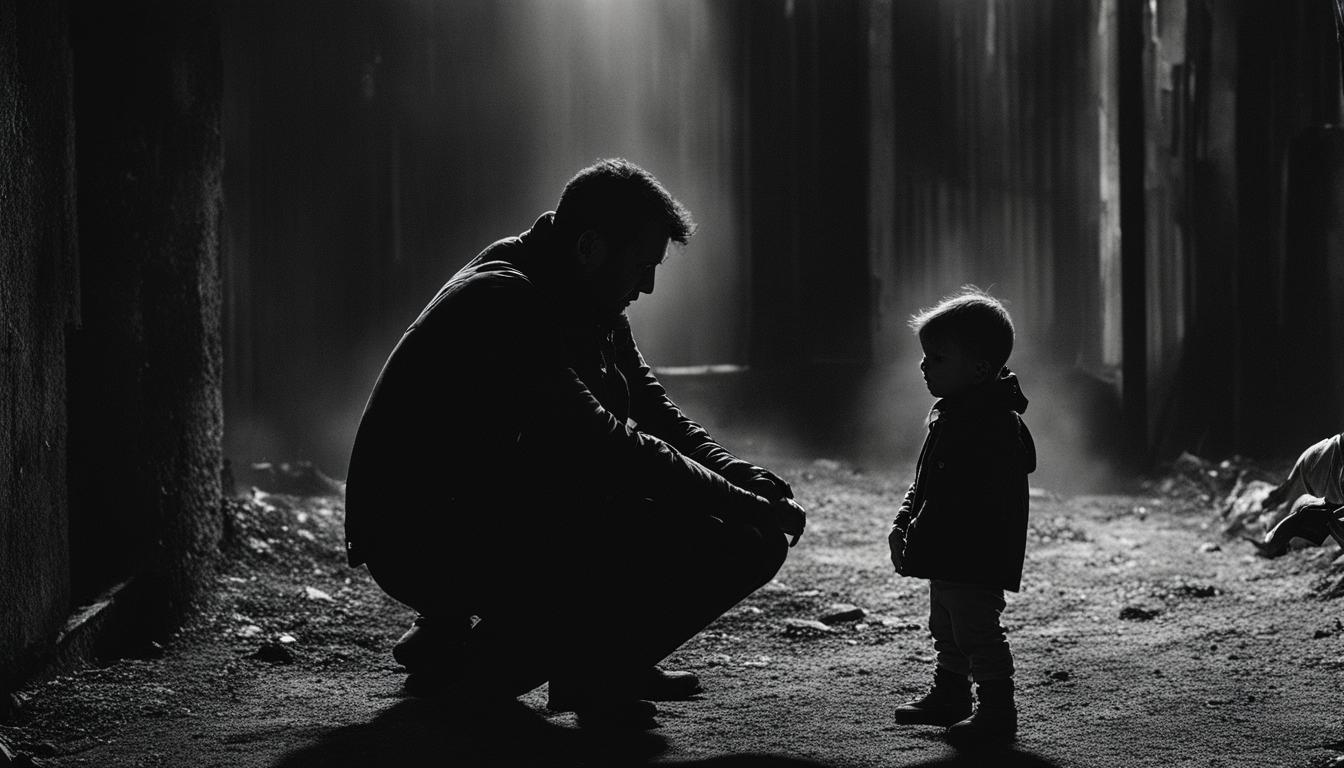Beginning the process of healing from a father with borderline personality disorder is like untangling a intricately woven tapestry of emotions that have become deeply ingrained in our being.
The process of healing from such a relationship can be as intricate as it is transformative, requiring patience and self-reflection.
Exploring the impact of a borderline father on our past can unearth buried emotions and shed light on present struggles, but understanding this connection is just the beginning of a path towards liberation and self-discovery.
Key Takeaways
- Setting firm boundaries crucial for emotional stability
- Seeking therapy specialized in BPD for effective healing
- Building strong support network aids in recovery
- Prioritize self-care to overcome emotional challenges
Impact of Borderline Father on Childhood
Growing up with a borderline father can profoundly shape a child's emotional development and interpersonal relationships. Children of borderline fathers often experience emotional instability, stemming from the erratic and intense emotions displayed by their fathers. This can lead to a deep-seated fear of abandonment, as the unpredictable nature of the father's behavior leaves the child feeling insecure and uncertain.
The inconsistent parenting style of a borderline father can result in identity confusion and low self-esteem in their children. These youngsters may struggle with forming secure attachments and maintaining stable relationships due to the challenges posed by their father's impulsive behaviors. The emotional turmoil created by a borderline father can have lasting effects on a child's ability to regulate their emotions, set boundaries, and develop a strong sense of self.
Emotional Challenges Faced in Adulthood

Navigating the emotional challenges faced in adulthood as a child of a borderline father requires a deep understanding of the impacts of inconsistent parenting behaviors on our emotional regulation and self-identity.
- Emotional Regulation: Growing up with a borderline father can disrupt our ability to manage emotions effectively, leading to difficulties in controlling reactions and responses in adult relationships.
- Self-Identity: Adult children of borderline fathers may struggle to form a stable sense of self, grappling with issues of chronic emptiness and low self-esteem that stem from early experiences of invalidation and emotional instability.
- Healthy Relationships: Coping with a fear of abandonment instilled by a borderline father can hinder our capacity to trust others and establish secure connections. Overcoming these challenges involves setting boundaries, seeking therapy, and prioritizing self-care to cultivate resilience and foster healthier relationship dynamics.
In facing these emotional challenges, we acknowledge the impact of our upbringing and commit to a journey of healing and growth towards emotional well-being.
Strategies for Healing and Recovery
In the journey towards healing and recovery from a borderline father, establishing firm boundaries is a crucial step in safeguarding our emotional well-being and autonomy. Setting clear limits on what behavior is acceptable and not tolerable can help create a sense of safety and control in our interactions with our parent.
Engaging in therapy with a mental health professional experienced in treating Borderline Personality Disorder (BPD) can provide valuable insights and tools to aid in our recovery journey. Developing self-awareness of how our father's behavior has impacted us is essential for healing and personal growth.
Practicing self-care activities such as mindfulness, journaling, and exercise can support our emotional healing process. Additionally, building a strong support network of friends, family, or support groups can offer validation, understanding, and encouragement as we navigate the complexities of recovering from a borderline father.
Prioritizing our well-being, autonomy, and emotional recovery is key to moving forward on the path to healing.
Establishing Boundaries With Borderline Father

Establishing clear and firm boundaries with a borderline father is a vital step towards protecting our emotional well-being and fostering healthy interactions. When dealing with a borderline father, it's essential to set boundaries that safeguard our mental health and prevent emotional harm. Here are three key aspects to consider when establishing boundaries:
- Defining Acceptable Behavior: Clearly outlining what behaviors are acceptable and unacceptable is crucial in interactions with a borderline father. This helps in establishing a framework for healthy communication and mutual respect.
- Communication Guidelines: Setting communication guidelines such as specific times for contact, preferred methods of communication, and topics that are off-limits can aid in managing interactions effectively.
- Reinforcement of Limits: Consistent reinforcement of boundaries is necessary to maintain the established limits. This reinforcement empowers us to prioritize our personal needs and well-being in the relationship dynamic with a borderline father.
Moving Forward Towards Emotional Well-being
To embark on the journey towards emotional well-being after dealing with a borderline father, it's crucial to prioritize self-care and seek support from understanding individuals. Recognizing the impact of growing up with a borderline father and the need to set boundaries is a significant step towards healing. Therapy or counseling can provide a safe space to address past traumas and work through unresolved feelings, fostering emotional healing and self-discovery. Engaging in self-care activities like mindfulness, journaling, or pursuing hobbies can further promote overall well-being.
Building a supportive network of friends or family who validate your experiences and offer empathy is essential for navigating this journey. It's important to understand that distancing yourself from a borderline father, if necessary for your mental health, is a valid choice. Prioritizing your well-being and surrounding yourself with positivity are crucial aspects of moving forward towards emotional well-being after dealing with a challenging upbringing.
Frequently Asked Questions
How Does Having a Borderline Parent Affect a Child?
Having a borderline parent can deeply impact a child, leading to emotional instability, fear of abandonment, and struggles with self-identity. This upbringing may result in chronic feelings of emptiness, difficulties with intimacy, and challenges forming healthy relationships.
Children of borderline parents often experience intense emotional reactions and unstable dynamics, contributing to a higher risk of developing borderline personality disorder themselves. The influence of a borderline parent can shape a child's psychological well-being and interpersonal skills significantly.
Can BPD Parent Cause Ptsd?
Oh, absolutely! Living with a BPD parent can definitely cause PTSD. The chronic instability and unpredictable behavior create a breeding ground for trauma.
Children may face emotional abuse and neglect, leading to lasting effects on mental health. Flashbacks, hypervigilance, and avoidance behaviors can all be triggered by past experiences.
It's a tough situation that can have a significant impact on a child's well-being.
How Do You Recover From a Borderline Parent?
We recover from a borderline parent by seeking therapy, setting boundaries, practicing self-care, joining support groups, and exploring modalities like DBT. These steps help us heal and learn coping skills to navigate the challenges of growing up with a borderline parent.
It's crucial to prioritize our emotional well-being and seek validation and understanding from others who've shared similar experiences. Recovery is a journey, but with dedication and support, it's possible to overcome the impacts of a borderline parent.
How Do You Deal With a Borderline Father?
Dealing with a borderline father can be challenging. We've found that setting clear boundaries and seeking therapy are crucial steps.
We've also learned that educating ourselves about borderline personality disorder helps us understand his behavior. Remember, self-care is essential for our well-being.
Finding support through therapy, support groups, and mental health professionals can make navigating this complex relationship more manageable. It's about prioritizing our mental health and seeking the help we need.
Conclusion
As we continue on our journey of healing from a borderline father, we must remember that our past doesn't define our future.
By acknowledging the impact of our childhood experiences, setting boundaries, and seeking support, we can reclaim our emotional well-being.
It's through self-awareness, self-compassion, and the willingness to break negative patterns that we can move forward with strength and resilience.
Remember, healing is possible, and we deserve to live a life free from the shadows of the past.









